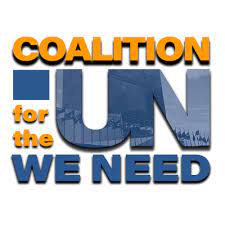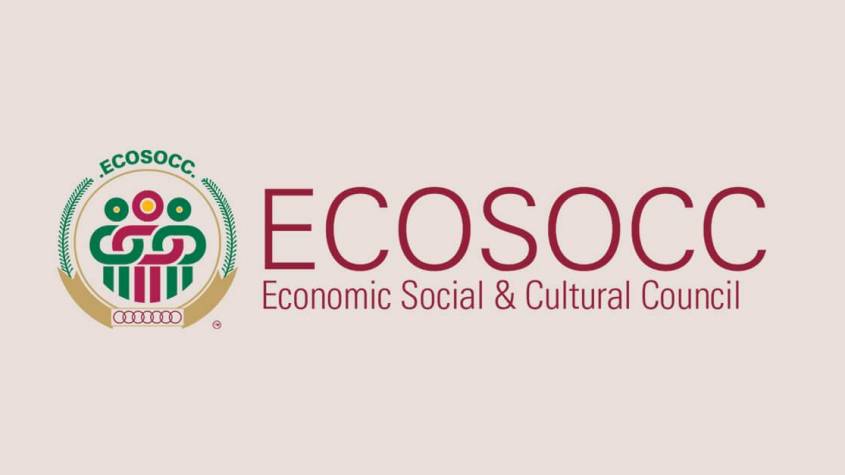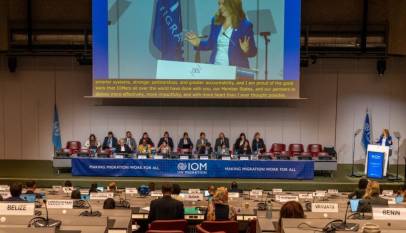C4UN-ECOSOCC: For a unified African front at 2024 UN Summit of the Future
As part of preparations for the 2024 UN Summit of the Future (SOTF), the African Union Economic Social and Cultural Council (AU-ECOSOCC) and Coalition for the UN We Need (C4UN), hosted a virtual African townhall on UN reforms to consolidate African voices in the ongoing negotiations leading to the SOTF.

The United Nations was established in 1945 in the aftermath of the Second World War to maintain international peace and security, as a replacement for the League of Nations, which had failed to guarantee the same objective. Yet, throughout its existence, the UN has also been criticized for its inability to manage global conflicts, lack of inclusivity and diversity, and failure to uphold the ideals of human rights as proclaimed in the Universal Declaration of Human Rights (UDHR).
In response to these criticisms, at the 72nd United Nations General Assembly (UNGA) in 2017, 120 UN Member States expressed their commitment to the reforms proposed by UN Secretary-General António Guterres. It was in this direction the UNSG’s Our Common Agenda (OCA) was designed to strengthen and accelerate multilateral agreements through inclusive and effective multilateralism, including the implementation of the 2030 Agenda for Sustainable Development.
To this end, the Coalition for the UN We Need (C4UN), a civil society grouping promoting multilateralism and international cooperation, is working with the UN, Member States, and civil society in support of the reforms of the UN. Last March, the C4UN hosted the Global Futures Forum (GFF) to harness diverse civil society perspectives on UN reforms as part of preparatory activities leading to the 2024 Summit of the Future (SOTF).
The SOTF is part of the UN reform process initiated by the UNSG to enhance international cooperation on critical challenges, address gaps in global governance and reaffirm existing multilateral commitments, including the Sustainable Development Goals (SDGs) and the UN Charter. The Summit will be preceded by a Ministerial Forum in September 2023, alongside the 2nd SDG Summit, aimed at creating conditions for a sustainable, equitable and inclusive future.
As part of preparations for the SOTF, the African Union Economic Social and Cultural Council (AU-ECOSOCC) and C4UN hosted a regional townhall on UN reforms last week Thursday to consolidate and deepen African voices, ensure African proposals are reflected in the ongoing negotiations leading to the SOTF, and particularly shape the C4UN’s Interim Peoples Pact for the Future, which captures diverse civil society perspectives from the multi-stakeholder consultations leading to the SOTF.
“Africa seeking inclusive, participatory decision-making within UN”
In his welcome remarks, Mr Khalid Boudali, the Presiding Officer of AU-ECOSOCC, said inasmuch as the UN remains the intergovernmental entity responsible for addressing global challenges as well as promoting peace and cooperation among its member nations, the global body must respond to the voices of citizens of the world, including African citizens, on the need to comprehensively reform itself by becoming more inclusive, effective and representative of the world’s diverse populations.
“African nations are seeking more inclusivity and participatory decision-making processes within the UN, which involves ensuring African countries have equal opportunity to contribute to policy formulation and decision-making on global issues. The voice and perspective of African countries should be heard and integrated into the UN agenda, including in peacekeeping operations, conflict resolutions, and sustainable development initiatives,” stressed Mr Boudali.
The AU-ECOSOCC chief also urged the UN to actively support the AU’s peace and security and sustainable development initiatives, noting that the SOTF offers a platform for African leaders and other stakeholders to engage in constructive dialogue and propose concrete steps for reshaping the UN. “SOTF should also articulate the specific needs and aspirations of the African people and ultimately aim to ensure a more balanced, inclusive and effective UN that is relevant in global governance affairs.”
“It’s time for Africa to insist on meaningful UN reforms”
In his keynote, Amb Claude Pierre, AU Permanent Representative to Southern Africa and COMESA, decried that even though Africa constitutes around 18% of the world’s population and African countries represent almost 28% of UN membership, the continent does not have permanent representation on the UN Security Council (UNSC), the most important body of the UN system. “Is it not time for global citizens to call for real reform of the United Nations? Is it not time for Africa to insist on meaningful reform of the UN?”
Amb Pierre therefore said since organized civil society plays a key role in the UN reform process, the C4UN offers a veritable platform to promote Africa’s interests in the reform process. “As you discuss together as African advocates, I look forward to your concrete recommendations on how African civil society, together with governments and the AU, can promote the development of common positions among African countries and constituencies for the interests of the African region.”
In this vein, the AU diplomat said the ECOSOCC-C4UN civil society town-hall will help consolidate and deepen African voices in ongoing negotiations leading to the SOTF and the formulation of the People’s Pact being developed through GFF. “Therefore, today’s town-hall is a critical milestone in the development of common positions by Africans to be jointly taken to the High-Level Policy Forum on Sustainable Development (HLPF), the SDGs Summit, and the preparatory Ministerial Forum ahead of the SOTF in 2024.”
“SOTF’ll explore synergy between Agenda 2030, Agenda 2063”
Oluseyi Oyebisi, Executive Director of the Nigeria Network of NGOs (NNNGO), a member of C4UN, recalled that the commemoration of the 75th anniversary of the UN in 2020 afforded CSOs the opportunity to share their thoughts and insights into the UN reforms and attainment of the SDGs. In addition, he said, the regional consultations hosted by C4UN in Africa, America and Asia helped the coalition mobilize civil society voices in support of UN reforms and the acceleration of SDG implementation.
Likewise, Mr Oyebisi said the GFF helped raise awareness, build ownership and mobilize civil society around the promise of the SOTF. “Through the GFF, we mobilized an ambitious set of outcomes that reinforce and accelerate the achievement of a reformed UN system and Agenda 2030. This will feed into the People’s Pact, which will serve as a document that all CSOs and citizens across regions of the world will use in negotiating the UN reform.”
In addition, Oyebisi said the African consultations leading to SOTF will also explore the need for synergy between the UN’s Agenda 2030 and the AU’s Agenda 2063 as part of the bigger African agenda. “This townhall serves as a platform for the African continent to further reinforce its position on the UN reforms. Our goal is to bring African voices into the conversation on the kind of UN we would like to see, including how to make Agenda 2063 a rallying point for the Africa We Want,” he stressed.
“It’s only logical for Africa to have a UNSC permanent seat”
Ms Yavi Madurai, Founder of the Pan-African Business Women Association (PABWA), decried the fact that despite the multiple wars happening around Africa, the world has only been focused on the Russia-Ukraine conflict. She described as only practical and logical the need for Africa to have a permanent seat at the UNSC, since three-quarters of the UNSC’s work is directed at Africa.
Ms Madurai described Africa as the definition of the future of the world, being the youngest continent and home to the fastest-growing workforce in the world, one with the potential to shape the future of the world. “Africa is statistically the definition of the world’s future. It is home to a significant percentage of our human resources. By 2030, 25% of the global workforce will come from Africa and by 2100, more than 80% of the world’s population will be either African or Asian.”
She said whereas the African Continental Free Trade Area (AfCFTA) seeks to increase intra-African trade by 50% by 2030 and by 80–90% when fully implemented, the fact that many African countries are dealing with violent conflicts means they are unable to trade with one another. “The AfCFTA will only work if there is peace and no conflict in Africa. As such, when we are in conflict, we don’t focus on trade and manufacturing but on wars and the importation of arms and ammunition from outside of Africa.”
“When united, Africans can make the UN reforms a reality”
In his closing remarks, Mr William Carew, Head of the ECOSOCC Secretariat, noted that the fact that the Organization of African Unity (OAU), which was founded in the mid-60s, had to be scrapped for the AU in the early 2000s was an indication that the UN also needed to be reformed. Mr Carew added that the AU itself is currently the subject of an institutional reform process led by President Paul Kagame of Rwanda.
“If the AU values the importance of reinventing itself, then why not the UN? Let me share some of the concerns that have been expressed by global citizens with regards to the UN and its alleged failures, particularly its inability to prevent conflicts. They include failure to stop the Rwandan Genocide in 1994; mishandling of the Cold War; the Arab-Israeli conflict and the Palestinian militancy; as well as the recognition of Taiwan,” he narrated.
Mr Carew said he was confident if Africans unite, they can make the UN reforms a reality and therefore encouraged the participants to join the campaign for the reform of the UN in Africa’s interest. “Together we will strive to ensure that African proposals are reflected in ongoing negotiations leading to the Summit of the Future more broadly and the outcomes in the Peoples Pact being developed through the Global Futures Forum,” he assured.
Way forward
The C4UN’s Interim People’s Pact is driven by five strategic objectives for the reform of the UN: a longer-term future orientation, global institutional reform, a whole-of-society approach, meeting existing commitments, and building trust. Likewise, the Pact is built around seven thematic areas: sustainable development, environmental governance, human rights, the global digital compact, global economic and financial architecture, peace and security, and global governance innovation.
Ahead of SOTF, C4UN will, in partnership with AU ECOSOCC and Oxfam International, host a side event on the theme: “Towards the Summit of the Future: aligning the 2030 Agenda to Agenda 2063” on the margins of the UN High Level Political Forum 2023 next July. Also, the outcomes of the ECOSOCC-C4UN townhall on the reforms of the UN and the predictable and sustainable funding of African-led Peace Support Operations, will be presented to global stakeholders at the next UNGA.
Between now and September, C4UN and partners will organize national and regional People’s Assemblies, culminating with the Global People’s Assembly taking place in New York on the margins of the UN SDG Summit. Ahead of the SOTF, C4UN has launched an Information Clearinghouse (ICH) to provide multi-stakeholder audiences, accurate, objective and timely information on the SOTF’s preparatory processes.













